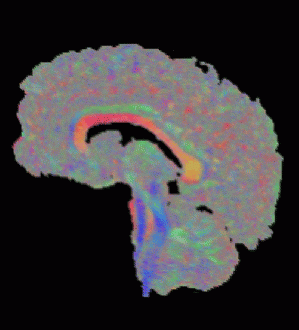I interviewed Darren Schreiber on February 23 rd . This is part two of a two part interview.
Here's a link to part one of the interview
Here's a link to the audio podcast.
Thanks to Don Caldarazzo for doing the transcript.
by Wikipedia
Eric Schreiber Bio:
by Eric schreiber
by Eric schreiber
D: So what we did with this
study -- we were really lucky. Other
researchers had been funded to do research on drug addiction and other forms of
addiction, and had given what they call the "Risky Gains Task" to large groups
of people. So this was funded by the NIH
and a bunch of other groups, trying to get a better sense of how the brain
functions. In particular, in this group
they were looking at some veterans, and ordinary citizens as well - a large
group of subjects, and as they brain imaged them, what they asked them to do
was what they called a Risky Gains Path.
[In] the Risky Gains Path, they basically give you twenty [20] cents,
and if you hit the button you get to take the twenty cents. Or you can let it
ride, and you can risk doubling that to forty cents - or losing forty
cents. And if you win the forty cents
you can gamble again, and have it become positive 80 cents - or lose 80
cents. So there is increasing risk and
increasing gains as you play this game, and they brain image people while they
were doing a series of these trials of this game again and again. I think about it as like blackjack in Vegas
and doubling down; you increase the amount of money that you're wagering with
each round. They then looked at the
subjects that were doing this and then found some patterns of different ways
that that people approach risk based on addiction.
We came to that group of researchers, my friend and colleague James
Fowler and I, and put together a large group of researchers to look at this
data, taking the people who had participated in the previous study and matching
their names to publicly available voter registration files. So, in California, when you register to vote
as a Democrat, Republican or whatever party, that's public record and we just
took the records and matched them to the names of the participants in this
study, and were able then to find out whether people registered Republican or
Democrat. We looked at the way
Republicans and Democrats can look to see about their gambling behavior first
off, and what we found is you can't tell whether somebody is Republican or
Democrat by how they gamble.
So, there's no difference in the behavior of the two: you couldn't go
to Las Vegas and find out whether someone is a Democrat because they held on a
sixteen. You can only do that by (we
found later on) looking at the brain imaging data and seeing the patterns that
differentiate Republicans and Democrats.
Next Page 1 | 2 | 3 | 4 | 5 | 6 | 7 | 8 | 9 | 10 | 11
(Note: You can view every article as one long page if you sign up as an Advocate Member, or higher).







